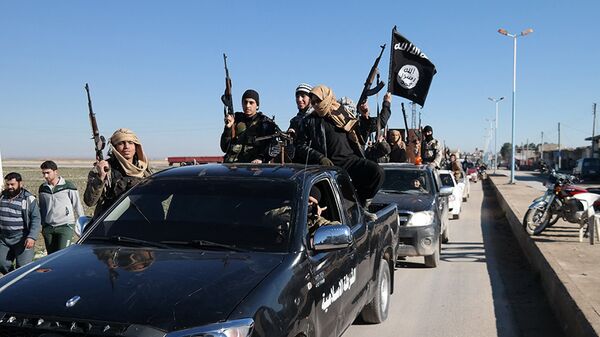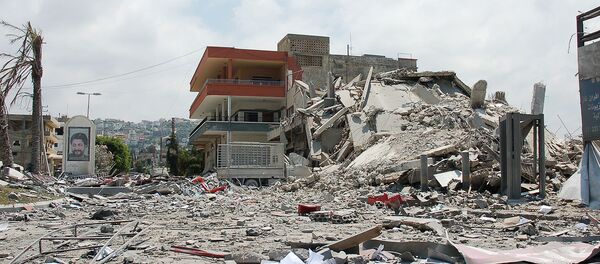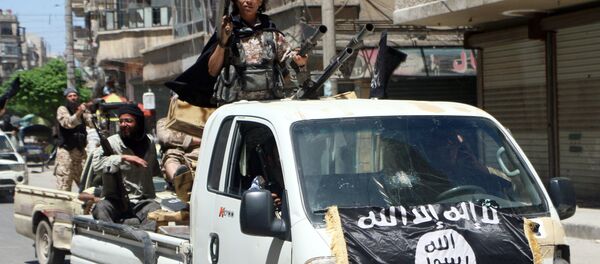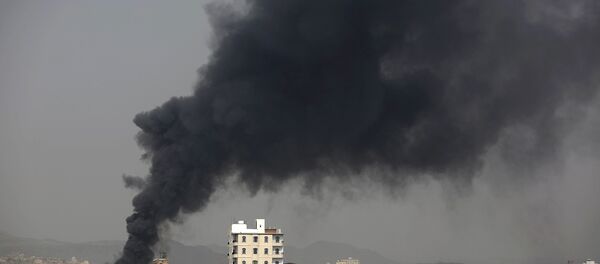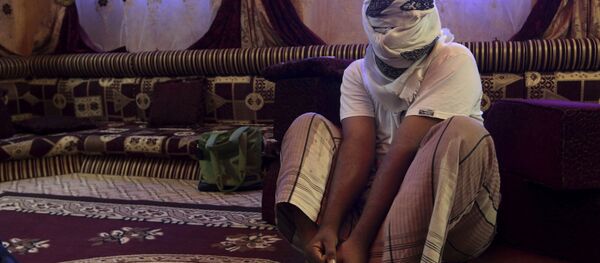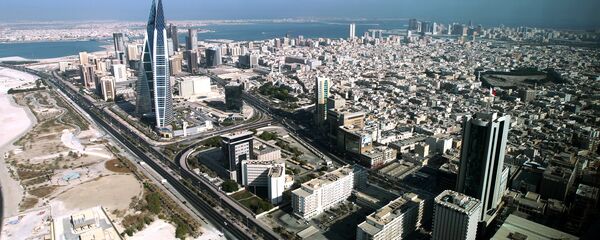The State Department made the accusation in its annual survey, which has previously named Iran as the world leader in terrorism. The six countries where Iranian meddling — overtly or through proxies — is said to be stirring up conflict and terrorism are: Lebanon, Syria, Iraq, Yemen, Bahrain and Afghanistan.
The year 2018 has seen enormous change in many parts of the Middle East, however. The Syrian war is dying down, and Iraq's elections saw the rise of a leader: Muqtada al-Sadr, a former anti-US fighter who was, prior to the elections, characterized by Western mainstream media as being likely to win on an anti-Iran ticket and after the elections said to be forming a pro-Iranian government.
Lebanon remains stable with a Hezbollah military presence larger than its army and members of Hezbollah in its government. Bahrain remains stable with its Shia majority and Sunni monarchy, with a little help from Saudi Arabia, and Afghanistan remains unstable, with the US government on track to have dropped more bombs than ever on the country since it started keeping track in 2009.
But in Yemen, the conflict is only getting worse, with more and more civilians killed by US-made bombs dropped primarily by Saudi Arabia and the United Arab Emirates.
If you read the Western press, it becomes difficult to sort out fact from fiction. Is al-Sadr pro- or anti-Iran? Is Iran really backing the Houthi government in Yemen? Is Hezbollah really a terrorist group, or is it an anti-terrorist group? Sputnik News spoke with Mohammad Marandi, an expert on American studies and postcolonial literature who teaches at the University of Tehran, about Iran's involvement in each country the US State Department said they're meddling with, in order to help make sense of the mess.
What follows is a lightly edited transcript of an interview Sputnik News conducted with Dr. Marandi on Thursday.
Lebanon
Ever since Hezbollah was created — and it was created as a result of the Israeli invasion of Lebanon [in 2006] — it was a national resistance organization, and it liberated the south of Lebanon and forced the Israelis to exit the country. So the creation of Hezbollah was a result of Israeli violence. Hezbollah has an armed wing that is in coordination with the Lebanese army and is accepted by the state. It is felt [by Lebanon] that it is necessary as a deterrence for further Israeli aggression.
In fact, in the years since the rise of Western and Saudi-backed extremists in Syria and the takeover of territory in Lebanon by these extremist groups, including ISIS [Daesh] and al-Qaeda, it was Hezbollah along with the army that helped to defeat and expel these groups from the country so I think that one could say that it is with the help of Hezbollah that the country has remained independent and that both the Israeli occupation and the existence of [Daesh] and al-Qaeda, or the Nusra Front, on Lebanese territory has come to an end.
Syria
It's the same argument. I would just add that again, as in Lebanon, where foreign powers such as the United States and regional powers such as Saudi Arabia, which helped the extremists in Syria — the spillover in Lebanon was blocked by Hezbollah. And the same is for Syria where US-backed and Western-backed and Saudi-backed and Israeli-backed extremists such as al-Qaeda and [Daesh,] they use different extremists groups with each one supported by a different foreign power, sometimes simultaneously different powers at the same time. Iran, Hezbollah and the Russians, as well as Iraqi and Afghani volunteers, helped push them back. Otherwise, if it wasn't for their support, black flags would have been flying over Damascus, and the same is true for Iraq.
In reality, the countries that have promoted violence in these countries such as Iraq, Syria, and Lebanon are the countries that have been promoting Wahhabism. It's the same thing that happened in Afghanistan in the 1980's. The United States and Saudi Arabia in the 190's created extremists in Afghanistan and now they've repeated this only much more extensively in Syria. The US policy of supporting extremists is nothing new, we saw it in Afghanistan and also Central American with the right-wing groups and the contras in Nicaragua, so this is nothing new for the United States.
Look at the 2012 Defense Intelligence Agency document that was partially released. The United States knew that in Syria, from almost the very beginning, the extremist groups were the strongest force that was fighting against the government. Then, their regional client regimes like Saudi Arabia, the United Arab Emirates, Turkey and others — they were supporting these groups and they were trying to help them establish a Salafist state in Syria and Iraq.
Of course the head of the Defense Intelligence Agency at that time, General Michael Flynn, he admitted that the United States took a willful decision to support its allies and client regimes in the region in their support for extremists. So, what went on in Syria, and the spillover in Iraq and in Lebanon, is what happened in Afghanistan in the 1980s, only it was a much larger catastrophe that was brought about by the western intelligence agencies cooperating with regional dictatorships by and large, especially Saudi Arabia
Iraq
The whole problem with the Western media and Western think tanks is that they try to present the situation in the region as the would like it to be. So, they said that opponents of Iran won the election. But we see that despite immense US pressure, the US candidate, who is the current Prime Minister of Iraq, doesn't seem to have any chance to remain as Prime Minister and that the groups that are closer to Iran are forming the government despite US threats, US pressure and contacts from senior officials — Secretary Pompeo made phone calls, the Special Envoy in Iraq [made calls] — they were cooperating with the Saudis and Emiratis to form a government that was close to the United States and hostile to Iran. But they failed.
The narrative that they've built, which is more closely affiliated with wishful thinking than they would like to admit, is very different from the reality on the ground. Iraq had a democratic election and the United States should accept the results, but they don't want to accept the results because the results present a picture that is uncomfortable for the United States; like in Gaza, when Hamas won the elections, the United States wouldn't accept it because the United States basically supports dictatorships in this region. If there are elections, the outcome must be to the liking of the United States, otherwise they won't accept it.
Yemen
The Iranians don't even have a real presence there, because the Yemenis are — this is one of the extraordinary things about the world that we live in — and that is that the Yemenis are surrounded by the Americans and the Saudis. The Americans and the Saudis have done something unprecedented in contemporary human history and that is that they imposed mass starvation on the whole country in order to bring the people to their knees.
Hundreds of thousands of people have died so far because of starvation and preventable diseases.Tens of thousands of people have died as a result of war. The Saudis have bombed weddings; they've bombed schools; they've bombed funerals; they've bombed hospitals; they've bombed school buses with impunity. They've used American weapons. Americans have been refueling their air force [during air strike missions]. Together, they're imposing this siege to prevent food from getting into the country.
— Dan Cohen (@dancohen3000) September 20, 2018
— Alex Rubinstein (@RealAlexRubi) September 13, 2018
Under normal circumstances, you would call this a holocaust, a genocide. But the western media is silent about it because they basically follow the foreign policy agenda of the US government. The Saudis are so unpopular that despite the fact that people are surrounded — and the Saudis and Emiratis are spending huge amounts of money in this war — they've been unable to get anywhere near the capital. They've made very little headway in the country. And al-Qaeda — the head of al-Qaeda in Yemen — has admitted that they are cooperating with the Saudi-led coalition. Everywhere in this region where we see the Saudis involved, we see either [Daesh] or al-Qaeda cooperating with them and the Americans allow them to do that. Whether the Americans are directly involved or indirectly involved, they're cooperating with [Daesh] and al-Qaeda.
In the past, they were allowing [Daesh] to thrive, and now they're allowing al-Qaeda to survive.
In Idlib, for example, we know that 70 percent of Idlib is controlled by al-Qaeda. The Americans have allowed that to happen. They've prevented the Syrian government from carrying out any attacks on al-Qaeda. This is the same group that carried out 9/11. This whole endless "War on Terror" that the United States has carried out, destroying country after country in this region from Afghanistan to Iraq to Libya to Syria to Yemen, it's all been carried out in the name of al-Qaeda. The United States is indirectly helping al-Qaeda. They are protecting al-Qaeda. Remember, [Daesh] was al-Qaeda before they split away.
Bahrain
Bahrain is very simple. The United States is supporting a dictatorship that has crushed the popular will. The Saudis, in order to prevent the fall of the regime and the family dictatorship; they occupy the country. Saudi troops are occupying Bahrain, so it's obvious who is carrying out terror, who is shooting people in the streets, who is killing protesters, who is murdering people under torture: the Bahraini regime with the Saudi regime and the United States backing them. The United States is trying to — whether it's in Yemen or Syria or Iraq or Lebanon or anywhere else — the United States is trying to create this false moral equivalency in order to make the atrocities carried out by their and by themselves look less evil.
The reality is, then, the United States is saying the regime that has killed many protesters, arrested and tortured many protesters, that has a family that is ruling over the population… and then you have Saudi forces coming in and killing people and occupying the country to keep the ruling family safe. The United States says ‘these are the good guys.' Just like in Yemen. Iran is evil somehow, yet the country is surrounded by a Saudi-American blockade which prevents food and medicine from getting into the country.
Afghanistan
In the case of Afghanistan, it's even more ridiculous. The Taliban has a Wahhabi ideology like Saudi Arabia. The only two countries in the world that officially recognized the Taliban as the legitimate government of Afghanistan until 9/11 was Saudi Arabia and the United Arab Emirates — both allies of the United States. If the United States had told them to cut diplomatic ties, they would have done it. What ideology does the Taliban have? It's Wahhabism. What ideology does [Daesh] have? It's Wahhabism. What ideology does al-Qaeda have? It's Wahhabism. What ideology does Boko Haram have? It's Wahhabism. All these groups get their ideology from one of the key allies of the United States in the region: Saudi Arabia.
Who is really the global leader in sponsorship of terrorism?
Sputnik News posed this question to Mirandi at the end of the interview. "In my opinion, the US government," Mirandi said.

